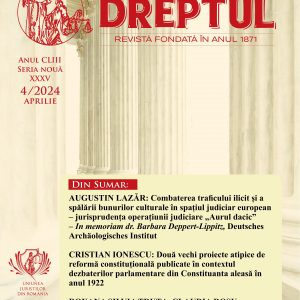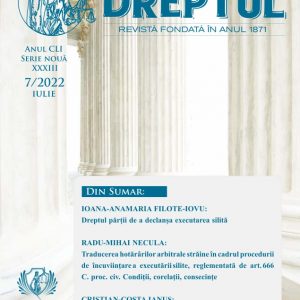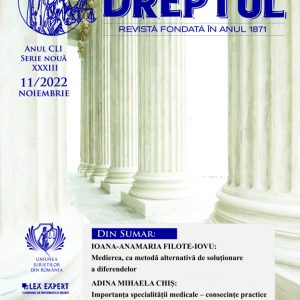-

-
 The Law No 95/2006 on the health reform stipulates, in Article 653 (2), that: „ the medical staff shall be liable under the civil law for the prejudices caused by error, which also include negligence, recklessness or insufficient medical knowledge in the exercise of the profession, by individual acts within the prevention, diagnosis or treatment procedures”. The text of law finds its applicability in the cases that raise for discussion whether the doctor’s diagnosis was a correct one and the chosen therapeutic conduct was necessary to restore the patient’s health condition. However, even under the terms of subsistence of the situation of error of diagnosis, this does not unconditionally engage the legal liability, an approach that makes necessary a distinction between the guilty diagnosis error and the excusable diagnosis error. In this study the authors intend to identify and analyze the hypotheses in which the doctor’s legal liability can operate/intervene in case of an error of diagnosis.
The Law No 95/2006 on the health reform stipulates, in Article 653 (2), that: „ the medical staff shall be liable under the civil law for the prejudices caused by error, which also include negligence, recklessness or insufficient medical knowledge in the exercise of the profession, by individual acts within the prevention, diagnosis or treatment procedures”. The text of law finds its applicability in the cases that raise for discussion whether the doctor’s diagnosis was a correct one and the chosen therapeutic conduct was necessary to restore the patient’s health condition. However, even under the terms of subsistence of the situation of error of diagnosis, this does not unconditionally engage the legal liability, an approach that makes necessary a distinction between the guilty diagnosis error and the excusable diagnosis error. In this study the authors intend to identify and analyze the hypotheses in which the doctor’s legal liability can operate/intervene in case of an error of diagnosis. -
 The judicial activity of the courts of law is meant to guarantee the fundamental rights and freedoms of the citizens, to ensure the observance of the supremacy of laws and to prevent the abusive exercise of power by the state representatives, thus having a fundamental function manifested in the form of the judiciary, within the constitutional architecture of Romania which is based on the classical theory of the separation of powers in the state. The Fundamental Law and the infra-constitutional legislation contain provisions meant to guarantee the independence and impartiality of the representatives of the judiciary, necessary to ensure the fulfilment of the jurisdictional function by these, respectively the correct interpretation and application of the laws. The increased importance of the creative role of the judges has led to its definition in the doctrine as being jurisprudential law, lately a cause for its strong development being the very increase of the activity of legislation, of regulating the conduct of the subjects of law by the state, in a multitude of areas of social and economic life. The amplification of this operation has led to the impossibility of regulating these conducts in detail by law, so that the executive and, respectively, the judiciary took over the task of ensuring the completion of the general framework provided by the legislative. The possible conflict between the legislative activity and the interpretation given to the legal norm by the judge may lead to situations in which the right be recreated, by way of interpretation. The current normative framework applicable in Romania allows to engage the liability of magistrates (prosecutors and judges) for the defective way in which they exercise their professional activity, their liability can take several forms, namely criminal, disciplinary or civil liability, depending on the consequences they generate.
The judicial activity of the courts of law is meant to guarantee the fundamental rights and freedoms of the citizens, to ensure the observance of the supremacy of laws and to prevent the abusive exercise of power by the state representatives, thus having a fundamental function manifested in the form of the judiciary, within the constitutional architecture of Romania which is based on the classical theory of the separation of powers in the state. The Fundamental Law and the infra-constitutional legislation contain provisions meant to guarantee the independence and impartiality of the representatives of the judiciary, necessary to ensure the fulfilment of the jurisdictional function by these, respectively the correct interpretation and application of the laws. The increased importance of the creative role of the judges has led to its definition in the doctrine as being jurisprudential law, lately a cause for its strong development being the very increase of the activity of legislation, of regulating the conduct of the subjects of law by the state, in a multitude of areas of social and economic life. The amplification of this operation has led to the impossibility of regulating these conducts in detail by law, so that the executive and, respectively, the judiciary took over the task of ensuring the completion of the general framework provided by the legislative. The possible conflict between the legislative activity and the interpretation given to the legal norm by the judge may lead to situations in which the right be recreated, by way of interpretation. The current normative framework applicable in Romania allows to engage the liability of magistrates (prosecutors and judges) for the defective way in which they exercise their professional activity, their liability can take several forms, namely criminal, disciplinary or civil liability, depending on the consequences they generate. -
 In a traffic accident resulting in numerous injuries there have been drawn up several forensic documents, the time limit for medical care being extended to 100 days because of the emergence of some post-operative complications. After numerous postponements and after the reinstatement of the case on the list of cases twice, the court requested that the acts be approved by the Superior Forensic Commission next to the National Institute of Forensic Medicine, although there were no contradictions between them. This body has decided that there is no causal relation between the accident and the extension of the number of days of medical care, invoking medical negligence and the failure of the injured person to go through the entire recovery treatment. Based on this advisory opinion the court has ordered the acquittal, ignoring the other evidence, without giving reasons. According to the author, the solution of the court is ungrounded and unlawful.
In a traffic accident resulting in numerous injuries there have been drawn up several forensic documents, the time limit for medical care being extended to 100 days because of the emergence of some post-operative complications. After numerous postponements and after the reinstatement of the case on the list of cases twice, the court requested that the acts be approved by the Superior Forensic Commission next to the National Institute of Forensic Medicine, although there were no contradictions between them. This body has decided that there is no causal relation between the accident and the extension of the number of days of medical care, invoking medical negligence and the failure of the injured person to go through the entire recovery treatment. Based on this advisory opinion the court has ordered the acquittal, ignoring the other evidence, without giving reasons. According to the author, the solution of the court is ungrounded and unlawful. -
 One of the constant elements of the civil procedural institutions is the classification of the nullities of the civil procedure acts into two categories: absolute nullities and relative nullities. This dichotomy involves an essentially different legal treatment applicable to them. However, in many situations, nullities of the civil procedural acts depart, in some aspects, from the „classic” rules involved by this classification. The author of this study refers to such nullities as „atypical nullities”.
One of the constant elements of the civil procedural institutions is the classification of the nullities of the civil procedure acts into two categories: absolute nullities and relative nullities. This dichotomy involves an essentially different legal treatment applicable to them. However, in many situations, nullities of the civil procedural acts depart, in some aspects, from the „classic” rules involved by this classification. The author of this study refers to such nullities as „atypical nullities”. -
 A “natural right” being most profoundly democratic not only retained, despite the historical vicissitudes, its intrinsic moral values, but due to the constant and firm “juridicization”, in another historical ambience, has increased these values and the implications of their valorization, while granting plenary sense to the contemporary “rule of law”, ensuring above all - according to the beautiful and meaningful saying of a historical figure - the protection of the “powerless people in front of power”: the right to request the assistance of a judge or the right of access to a judge. Article 5 of the Code of Civil Procedure recalls us that right, but unfortunately, as it does, requires again to make any effort for the consistent and undoubtedly useful understanding from the social point of view of its purposes.
A “natural right” being most profoundly democratic not only retained, despite the historical vicissitudes, its intrinsic moral values, but due to the constant and firm “juridicization”, in another historical ambience, has increased these values and the implications of their valorization, while granting plenary sense to the contemporary “rule of law”, ensuring above all - according to the beautiful and meaningful saying of a historical figure - the protection of the “powerless people in front of power”: the right to request the assistance of a judge or the right of access to a judge. Article 5 of the Code of Civil Procedure recalls us that right, but unfortunately, as it does, requires again to make any effort for the consistent and undoubtedly useful understanding from the social point of view of its purposes. -

-
 Factoring is essentially a hybrid commercial operation that covers the elements of several legal mechanisms, the most common elements being borrowed from the debt assignment mechanism. However, the legislator did not consider it necessary to establish this legal operation in the contracts covered by the new Civil Code. Moreover, factoring does not currently benefit from any express regulation in Romanian law. Although, in the Romanian doctrine, we find references to a possible direct action of the factor against the assigned debtor, the situation of this action is uncertain. In this sense, we considered it opportune, but also necessary to formulate a brief analysis of what the factoring operation means in general, as well as to establish whether or not the factor’s action covers the elements of a direct action. In the Romanian doctrine and legislation we find only fragments of texts regarding the factoring operation, therefore, an exhaustive analysis regarding the application of factoring and even more so of the factor’s action cannot be performed. However, we hope that the brief explanations we will bring will lead to an outline, at least general, of the factor’s action against the assigned debtor.
Factoring is essentially a hybrid commercial operation that covers the elements of several legal mechanisms, the most common elements being borrowed from the debt assignment mechanism. However, the legislator did not consider it necessary to establish this legal operation in the contracts covered by the new Civil Code. Moreover, factoring does not currently benefit from any express regulation in Romanian law. Although, in the Romanian doctrine, we find references to a possible direct action of the factor against the assigned debtor, the situation of this action is uncertain. In this sense, we considered it opportune, but also necessary to formulate a brief analysis of what the factoring operation means in general, as well as to establish whether or not the factor’s action covers the elements of a direct action. In the Romanian doctrine and legislation we find only fragments of texts regarding the factoring operation, therefore, an exhaustive analysis regarding the application of factoring and even more so of the factor’s action cannot be performed. However, we hope that the brief explanations we will bring will lead to an outline, at least general, of the factor’s action against the assigned debtor. -
 The present study illustrates a sensitive issue of the disciplinary procedure concerning civil servants, insufficiently debated in the speciality literature, namely the possibility of the titular of the disciplinary complaint to resort to the courts in order to refute the report by which the disciplinary investigation is finalized with a proposal to classify the complaint. The research is structured starting from the solution given to this issue by the courts themselves, in the few decisions that deal with the subject, a solution which the author attempts to combat in the light of the current legislation in force, insufficient in its turn, corroborated with the relevant approaches taken from the decisions of the Constitutional Court. Apart from the elements of novelty and originality of the analysis, it is distinguished by its applied character, knowing the ideas conveyed by the author being necessary not only for the civil servants involved in disciplinary conflicts – as defending parties or as members of the disciplinary commissions –, but also for the judges called upon to decide on the legality and grounds of the solutions for dismissal of the disciplinary complaints. The thesis of inadmissibility of the actions seeking the annulment of the dismissal solutions should be reconsidered, the author’s opinion being that the commissions’ reports can be included among the administrative acts (by express or tacit validation by the leader to whom they are presented) or in the refusal to perform an administrative operation, as a challengeable act under Article 8 (1) of the Law on administrative disputes No 554/2004. It is certain that concealing reports from the commission against any form of control is not only harmful (at least at moral level) to the titular of the complaint, but also abnormal, unjust and unlawful.
The present study illustrates a sensitive issue of the disciplinary procedure concerning civil servants, insufficiently debated in the speciality literature, namely the possibility of the titular of the disciplinary complaint to resort to the courts in order to refute the report by which the disciplinary investigation is finalized with a proposal to classify the complaint. The research is structured starting from the solution given to this issue by the courts themselves, in the few decisions that deal with the subject, a solution which the author attempts to combat in the light of the current legislation in force, insufficient in its turn, corroborated with the relevant approaches taken from the decisions of the Constitutional Court. Apart from the elements of novelty and originality of the analysis, it is distinguished by its applied character, knowing the ideas conveyed by the author being necessary not only for the civil servants involved in disciplinary conflicts – as defending parties or as members of the disciplinary commissions –, but also for the judges called upon to decide on the legality and grounds of the solutions for dismissal of the disciplinary complaints. The thesis of inadmissibility of the actions seeking the annulment of the dismissal solutions should be reconsidered, the author’s opinion being that the commissions’ reports can be included among the administrative acts (by express or tacit validation by the leader to whom they are presented) or in the refusal to perform an administrative operation, as a challengeable act under Article 8 (1) of the Law on administrative disputes No 554/2004. It is certain that concealing reports from the commission against any form of control is not only harmful (at least at moral level) to the titular of the complaint, but also abnormal, unjust and unlawful. -
 Active procedural quality and interest are essential conditions for promoting any action in court. The verification of the two conditions must be carried out from the outset, firstly, by the person or persons initiating an action in court and, secondly, by the court which is invested with resolving the action. The lack of one of the two conditions paralyzes the resolution of the action on the merits and attracts the rejection of the action, either as being introduced by a person lacking procedural quality, or as being without interest. It is not often that in the defenses formulated by the defendant the exception of the lack of active procedural capacity and the exception of the lack of interest are invoked at the same time. Concomitant invocation is often natural, as procedural quality and interest are two elements which, although not confusing, often justify each other. However, I have encountered in practice multiple situations in which the active procedural capacity has been justified by the applicant’s/applicants’ interest in promoting the action. On the other hand, there may be situations, less common in practice, in which the interest is justified by the procedural quality. Here that the two basic elements of any action or lawsuit are often indissoluble, and their concomitant treatment appears natural. That is why I considered it opportune to carry out a brief study on how the interest justifies the active procedural quality, with references to certain solutions encountered in judicial practice or to solutions that had as inspiration the invocation of exceptions, thus trying to argue which, on the one hand, the two exceptions are invoked together, most of the time and, on the other hand, why, in a particular way, the interest justifies the procedural quality. At the same time, the study includes a comparison between the situations in which the interest is analyzed as an exception and the situations in which the interest must be analyzed on the merits.
Active procedural quality and interest are essential conditions for promoting any action in court. The verification of the two conditions must be carried out from the outset, firstly, by the person or persons initiating an action in court and, secondly, by the court which is invested with resolving the action. The lack of one of the two conditions paralyzes the resolution of the action on the merits and attracts the rejection of the action, either as being introduced by a person lacking procedural quality, or as being without interest. It is not often that in the defenses formulated by the defendant the exception of the lack of active procedural capacity and the exception of the lack of interest are invoked at the same time. Concomitant invocation is often natural, as procedural quality and interest are two elements which, although not confusing, often justify each other. However, I have encountered in practice multiple situations in which the active procedural capacity has been justified by the applicant’s/applicants’ interest in promoting the action. On the other hand, there may be situations, less common in practice, in which the interest is justified by the procedural quality. Here that the two basic elements of any action or lawsuit are often indissoluble, and their concomitant treatment appears natural. That is why I considered it opportune to carry out a brief study on how the interest justifies the active procedural quality, with references to certain solutions encountered in judicial practice or to solutions that had as inspiration the invocation of exceptions, thus trying to argue which, on the one hand, the two exceptions are invoked together, most of the time and, on the other hand, why, in a particular way, the interest justifies the procedural quality. At the same time, the study includes a comparison between the situations in which the interest is analyzed as an exception and the situations in which the interest must be analyzed on the merits. -
 The preliminary chamber is a new, partly innovative institution for the national criminal proceedings. In fact, this is a qualitative transformation of the provisions of Article 300 of the Criminal Procedure Code of 1968. The preliminary chamber judge is vested with a control form with a specific object and the finality of this control consists in ordering the file for the trial stage on the merits. The jurisdictional control of the preliminary chamber falls within the scope of the entire criminal proceedings as a distinct stage, with its own individualized object.
The preliminary chamber is a new, partly innovative institution for the national criminal proceedings. In fact, this is a qualitative transformation of the provisions of Article 300 of the Criminal Procedure Code of 1968. The preliminary chamber judge is vested with a control form with a specific object and the finality of this control consists in ordering the file for the trial stage on the merits. The jurisdictional control of the preliminary chamber falls within the scope of the entire criminal proceedings as a distinct stage, with its own individualized object. -
 The objective of this short study is to answer a question: is there today a „contraventional law”, as a result of the fragmentation of the administrative law? Assuming the answer is affirmative, we must establish whether the contraventional law itself faces today a process of fragmentation, i.e. if we can talk, for example, about a road contraventional law, a contraventional law of competition, a fiscal contraventional law, etc.
The objective of this short study is to answer a question: is there today a „contraventional law”, as a result of the fragmentation of the administrative law? Assuming the answer is affirmative, we must establish whether the contraventional law itself faces today a process of fragmentation, i.e. if we can talk, for example, about a road contraventional law, a contraventional law of competition, a fiscal contraventional law, etc.
